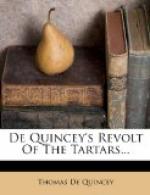On the 21st of January, 1761, the young Prince Oubacha assumed the sceptre of the Kalmucks upon the death of his father. Some part of the power attached to this dignity he had already wielded since his fourteenth year, in quality of Vice-Khan, by the express appointment and with the avowed support of the Russian Government. He was now about eighteen years of age, amiable in his personal character, and not without titles to respect in his 5 public character as a sovereign prince. In times more peaceable, and amongst a people more entirely civilized or more humanized by religion, it is even probable that he might have discharged his high duties with considerable distinction; but his lot was thrown upon stormy 10 times, and a most difficult crisis amongst tribes whose native ferocity was exasperated by debasing forms of superstition, and by a nationality as well as an inflated conceit of their own merit absolutely unparalleled; whilst the circumstances of their hard and trying position under 15 the jealous surveillance of an irresistible lord paramount, in the person of the Russian Czar, gave a fiercer edge to the natural unamiableness of the Kalmuck disposition, and irritated its gloomier qualities into action under the restless impulses of suspicion and permanent distrust. No 20 prince could hope for a cordial allegiance from his subjects or a peaceful reign under the circumstances of the case; for the dilemma in which a Kalmuck ruler stood at present was of this nature: wanting the support and sanction of the Czar, he was inevitably too weak from 25 without to command confidence from his subjects or resistance to his competitors. On the other hand, with this kind of support, and deriving his title in any degree from the favor of the Imperial Court, he became almost in that extent an object of hatred at home and within the 30 whole compass of his own territory. He was at once an object of hatred for the past, being a living monument of national independence ignominiously surrendered; and an object of jealousy for the future, as one who had already advertised himself to be a fitting tool for the ultimate purposes (whatsoever those might prove to be) of the Russian Court. Coming himself to the Kalmuck sceptre under the heaviest weight of prejudice from the unfortunate circumstances of his position, it might have been 5 expected that Oubacha would have been pre-eminently an object of detestation; for, besides his known dependence upon the Cabinet of St. Petersburg, the direct line of succession had been set aside, and the principle of inheritance violently suspended, in favor of his own 10 father, so recently as nineteen years before the era of his own accession, consequently within the lively remembrance of the existing generation. He, therefore, almost equally with his father, stood within the full current of the national prejudices,




